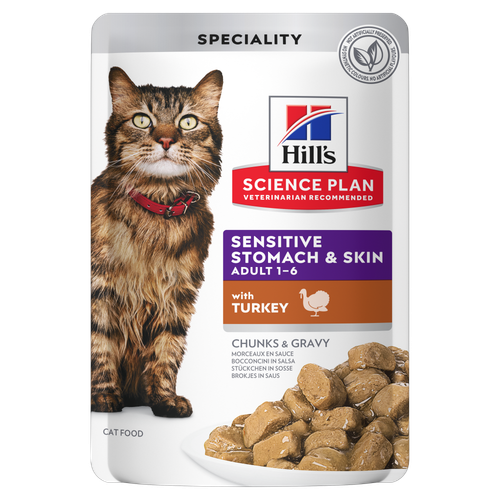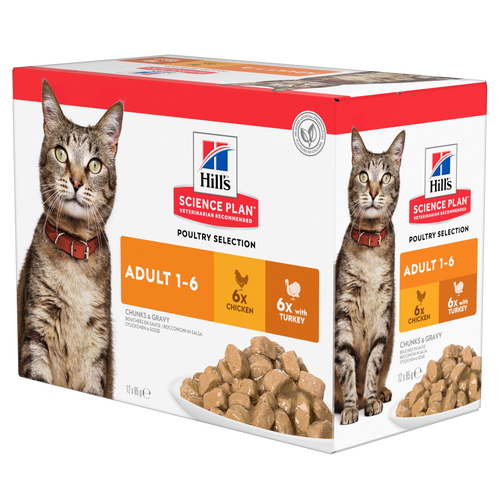
-
Find the right food for your petTake this quiz to see which food may be the best for your furry friend.Find the right food for your petTake this quiz to see which food may be the best for your furry friend.Featured products
 Perfect Weight Small & Mini Adult Dog Food
Perfect Weight Small & Mini Adult Dog FoodHill's Science Plan Adult Small & Mini Dog Food with Turkey is a complete premium pet food for adult small dogs from 1 year old that are prone to weight gain or slightly overweight. This deliciously smooth mousse is formulated to deliver the appropriate amount of energy to support weight maintenance in adult dogs.
Shop Now Perfect Digestion Small & Mini Adult Dog Food
Perfect Digestion Small & Mini Adult Dog FoodHill's Science Plan Perfect Digestion Small & Mini Adult Dog Food with Turkey is a complete premium pet food for small breed adult dogs aged 1–6 years. This deliciously smooth mousse is precisely balanced to deliver the appropriate amount of energy and to support digestive health in adult, small breed dogs.
Shop Now Sensitive Stomach & Skin Dog Food
Sensitive Stomach & Skin Dog FoodHill's Science Plan Sensitive Stomach & Skin Adult Wet Dog Food with Chicken is a complete premium dog food for adult dogs from 1 year. This savoury tinned loaf is enriched with ingredients that support digestive health & skin care.
Shop NowFeatured products Hairball & Perfect Coat Adult Dry Cat Food with Chicken
Hairball & Perfect Coat Adult Dry Cat Food with ChickenHill's Science Plan Hairball & Perfect Coat Adult Cat Food with Chicken is formulated to effectively help avoid hairball formation in adult cats while promoting a beautiful coat. Thanks to its mix of essential omega-6 fatty acids, this food benefits the cat's skin and fur, keeping them healthy and shiny. Our Advanced Fibre Technology helps reduce hairballs by naturally promoting their passage through the gut. This food is formulated with high-quality protein for a perfectly balanced, great-tasting recipe.
Shop Now Sensitive Stomach & Skin Adult Cat Food
Sensitive Stomach & Skin Adult Cat FoodHill's Science Plan Sensitive Stomach & Skin Adult Wet Cat Food with Turkey is a complete pet food for adult cats, aged 1–6 years. This highly digestible wet food comes in a pouch and supports healthy digestion, as well as nourishes skin and promotes a thick and lustrous coat.
Shop Now Sterilised Adult Cat Food
Sterilised Adult Cat FoodHill's Science Plan Adult Sterilised Cat Dry Food with Salmon is specially formulated with ActivBiome+ Multi-Benefit Technology. It is a precisely balanced nutrition, tailored to meet the needs of sterilised cats, to help keep them lean & healthy.
Shop Now -
Dog
- Dog Tips & Articles
-
Health Category
- Weight
- Food & Environmental Sensitivities
- Urinary
- Digestive
- Joint
- Kidney
-
Life Stage
- Puppy Nutrition
- Adult Nutrition
- Senior Nutrition
Cat- Cat Tips & Articles
-
Health Category
- Weight
- Skin & Food Sensitivities
- Urinary
- Digestive
- Kidney
-
Life Stage
- Kitten Nutrition
- Adult Nutrition
Featured articles The Incredible Science Behind Your Pet's Microbiome
The Incredible Science Behind Your Pet's MicrobiomeLearn what your pet's microbiome is, how it contributes to your pet's gut and overall health, and why nutrition is important in maintaining healthy microbiomes.
Read More Show some love with wet foods: a great choice for pets with health issues
Show some love with wet foods: a great choice for pets with health issuesShow some love with wet foods: a great choice for pets with health issues.
Read More The Right Diet For Your Pet
The Right Diet For Your PetIn people, the right diet is very important. If you are eating the wrong way for your metabolism, activity level, age and lifestyle you could end up with health issues.
Read More -


If you’re thinking about neutering your cat or dog you may be wondering what’s involved and how you might make the process as easy as possible. We also have other articles on the benefits of neutering cats and neutering dogs and what changes you might see afterwards if you’re interested. For now though let’s see what you can do to help before and after the day itself.
Talk to your vet/nurse team. Make sure you understand exactly what is involved and why they might be asking you to do certain things.
Follow the pre-operative advice. You might be told to withhold food from the night before and water from the morning of the op. This is important for anaesthetic safety so make sure food is out of reach. Don’t feel guilty. It’s one night and it’s most certainly for their own good.
Keep your cat in! Even if your cat is always home in the morning you can bet that the day you really need them to be there they will be off galavanting round the neighbourhood. It might be a pain to keep them in but we have to cancel and delay plenty of cat neutering operations because of cats that have gone out at exactly the wrong time!
Toys, blankets and home comforts. Ask your vet if they’re happy for you to take your pet’s own bed or their favourite toy in with them. The smell of home can help them feel happier while they are away from you.
The cone of shame! You may be asked to put a surgical collar on your pet. These are notoriously annoying for everyone concerned but the few days they need to be worn are small fry compared to an opened up abdominal wound and all the complications as well as the extra expense that come with it.


Tasty Tips
Young pets may need several visits in their first year for vaccinations. Adult pets generally benefit from annual check-ups, while senior or special-needs pets might require more frequent visits.
Exercise. You might be told to keep your cat in for one or more nights after the op and your dog may not be allowed off the lead for a couple of weeks. Neutering female pets may be routine but is still fairly major abdominal surgery even if done with keyhole surgery (laparoscopy). Follow this advice to help them heal properly, The better the recovery the quicker they’ll be back tearing round the park.
Go for your post-op checks. These are important for spotting whether there are any issues with the wound or signs of infection.
Give the medication you are given. You may be given pain-relief medication for your pet post-op. Your vet will try and make sure this is as easy to give as possible. Do your best because cats and dogs that are pain-free will bounce back much quicker than those that can’t face the idea of moving or eating.
Be prepared for their friend to act differently. If you have other pets in the house they sometimes act quite differently when the other pet comes home. The hospital environment makes them smell weird and the cone can scare other pets. Give it a day or two and they’ll soon be friends again. Don’t force it.
Talk to your vet about feeding. Your pet may need some special, easily digested food the night of the operation but longer term it might be time to change to a food for neutered cats or dogs. Don’t ever change food without talking to your vet. Especially if your pet is still growing.
It’s totally normal as an owner to feel guilty about neutering their pet. Imagine how guilty I felt when it was actually me that castrated both my beautiful dogs, Pan and Badger! The thing to remember is that it is soon over and the benefits for both you and your pets are many.


One of our staff authors prepared this article for you
Related products

Tender chicken chunks in gravy for cats, with L-carnitine and fewer calories for ideal weight management. Packed with high-quality protein, omega-6s, and vitamin E for shiny fur and healthy skin.

Tender chicken chunks in gravy for mature adult cats. Made with easy-to-digest ingredients, high-quality protein for lean muscle maintenance and antioxidant vitamins C+E for optimal health.


Tender chunks in gravy for cats, with high-quality protein to maintain lean muscle. With vitamin E and omega-3s & -6s for healthy skin and balanced minerals to support healthy vital organs.
Related articles

Show some love with wet foods: a great choice for pets with health issues.

To make a protein, amino acids are linked together in a long chain. The chain is then bundled into to a three-dimensional structure, like a tangled ball of yarn.

In people, the right diet is very important. If you are eating the wrong way for your metabolism, activity level, age and lifestyle you could end up with health issues.

Learn what your pet's microbiome is, how it contributes to your pet's gut and overall health, and why nutrition is important in maintaining healthy microbiomes.

Put your pet on a diet without them knowing
Our low calorie formula helps you control your pet's weight. It's packed with high-quality protein for building lean muscles, and made with purposeful ingredients for a flavourful, nutritious meal. Clinically proven antioxidants, Vitamin C+E, help promote a healthy immune system.
Put your pet on a diet without them knowing
Our low calorie formula helps you control your pet's weight. It's packed with high-quality protein for building lean muscles, and made with purposeful ingredients for a flavourful, nutritious meal. Clinically proven antioxidants, Vitamin C+E, help promote a healthy immune system.

